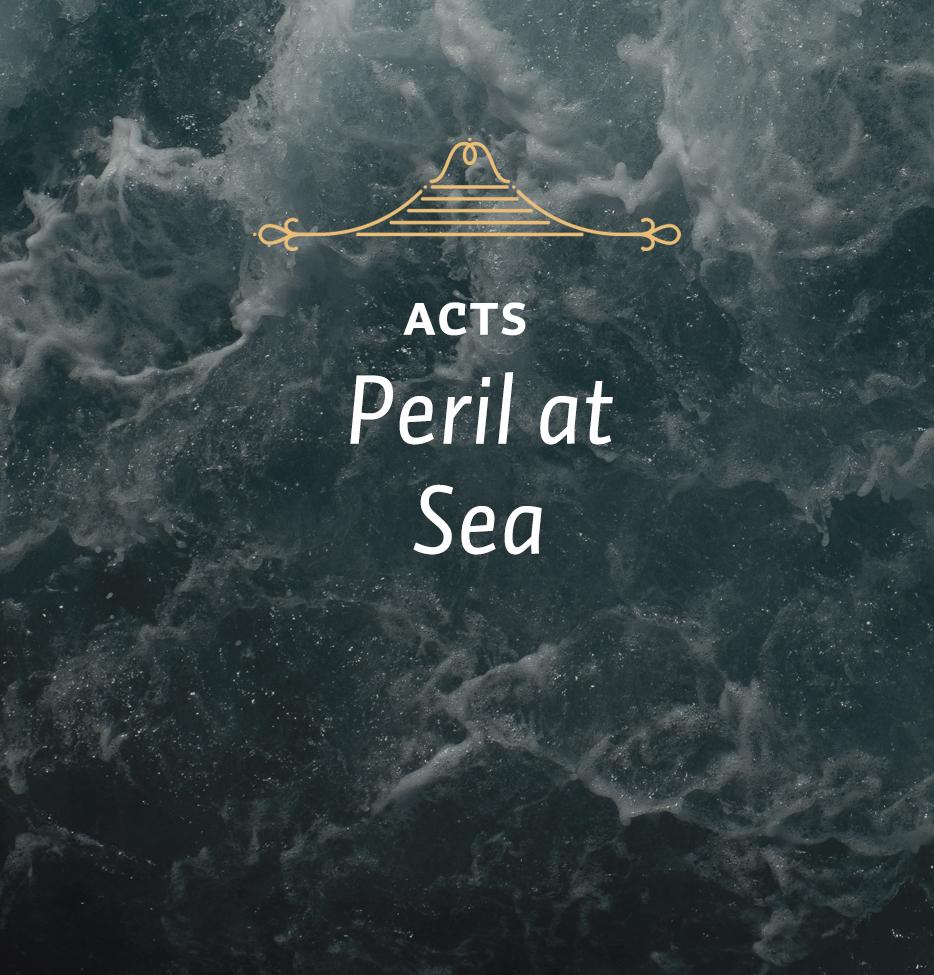As noted in yesterday’s lesson, the account of Paul’s voyage in a storm at sea brings to mind other accounts in Scripture of people being caught at sea in a storm. In the fourteenth chapter of Matthew, we have a story in which the Lord sent the disciples across the sea ahead of Him, saying that He would join them later on the other side. While they were crossing the sea another storm came up. They were rowing furiously when suddenly they saw Jesus coming to them, walking on the water. It is the incident in which Peter, having grown in his faith, said, “If Jesus can do that and if he wants me to do it, well, then, I can do it, too.” So Peter said, “Lord, if it’s you, tell me to come to you on the water” (Matt. 14:28).
Jesus said, “Come.”
Peter got out of the boat and started to walk toward him. But then Peter took his eyes off Jesus and began to look at the waves. His faith faltered and, as his faith faltered, he began to sink. He would have drowned if Jesus had not reached out His hand, took Peter by the arm, lifted him up, and brought him back into the boat.
These stories show the growth in faith of a disciple of Jesus Christ from a very small beginning, and the power of Jesus Christ over adverse natural elements.
The third storm is the one we probably know best. It is the storm that overtook Jonah when he was sailing from Joppa to Tarshish, on the far side of the Mediterranean. Jonah was trying to run away from God. God had told him to preach in Nineveh, which was in exactly the opposite direction. But because Jonah did not like the Ninevites he started out for Tarshish. God sent a great storm to overtake the ship that was taking him away.
There are many lessons in that story, and it is worth commenting on some of them. First, the God who was able to calm the storm in the first two stories is the same God who will stir the storm up if we are running from Him. God can bring tranquility to your life; He often does. But if you run away from Him, He is able to upset your peaceful life and turn it into a veritable turmoil. He has determined that you will go in His way. If you decide that you do not want to do it, He will trouble you so that your life will become extremely uncomfortable.
Second, although Jonah paid his fare to Tarshish, he never got to where he was going. When I have taught the book of Jonah, I have often pointed out that he did not get his money back either, noting that it is always that way when you try to run away from God. You never get where you are going, and you always pay your own fare. But when you go God’s way, He pays the fare and you always get to where you are going.
Third, Jonah’s disobedience brought those who were with him into peril. It was not only Jonah who was about to drown on the ship; the mariners were about to drown, too. The only reason they were spared is that Jonah said, “Pick me up and throw me into the sea…I know that it is my fault that this great storm has come upon you” (Jonah 1:12). They did not want to do it. That is not the way you treat passengers, generally. But in the end they did. They threw him overboard, and the waves were still.
The story of the fourth storm has lessons that are equally great, in some ways perhaps even greater than the others. But the place to begin is with the details of the route the people who were traveling to Rome took. It might be helpful to follow Paul and his companions’ movements on a map.
To begin with, the soldiers used several ships. They set out on the first one in order to work their way up the Mediterranean’s eastern coast, around the edge of what we call Turkey, gradually making their way west. They had difficulty because at this time of year sailing west was hard. It was now late fall—the fast mentioned in verse 9 was in October—and the prevailing winds were from the west. To go from west to east was all right. But to go from east to west was hard. Besides, the storm season came on in early November, and at that time sailing on the Mediterranean usually ceased for the winter. Sailors simply pulled their boats up on the shore and did not launch them again until spring.
The little company did the best they could, eventually making their way around the coast to the town of Myra in Lycia. Yet this was still on the southern edge of Asia and not very far along at all. They changed ships there, switching to a larger Alexandrian ship. The smaller ship would presumably continue on around the coast of Asia while the larger ship moved more directly westward over the open sea.






